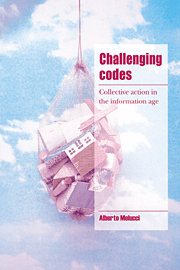Book contents
- Frontmatter
- Contents
- Preface and acknowledgements
- Introduction
- Part I Theory of collective action
- Part II Contemporary collective action
- Part III The field of collective action
- 11 A society without a centre
- 12 The political system
- 13 The state and the distribution of social resources
- 14 Modernization, crisis, and conflict: the case of Italy
- Part IV Acting collectively
- References
- Index
11 - A society without a centre
Published online by Cambridge University Press: 23 November 2009
- Frontmatter
- Contents
- Preface and acknowledgements
- Introduction
- Part I Theory of collective action
- Part II Contemporary collective action
- Part III The field of collective action
- 11 A society without a centre
- 12 The political system
- 13 The state and the distribution of social resources
- 14 Modernization, crisis, and conflict: the case of Italy
- Part IV Acting collectively
- References
- Index
Summary
Myths of totality
In its formative stage, a ‘movement’ always adopts the language of previous struggles. Still unable to define itself in terms of an identity of its own, the new collective actor uses the symbols, the organizational experience, and the forms of action of the movements that preceded it. Tradition can be used to convey new meanings (Burke 1969; Shils 1981; Hobsbawm and Ranger 1983) and this does not necessary imply that the collective actor is backward oriented, as some authors tend to think (see, for instance, Calhoun 1983). Thus the working-class movement spoke for longtime the language of the French Revolution before turning to socialism (Sewell 1980); in a similar way, the movements that arose in the 1960s drew on scholastic Marxism. While at that time Marxism itself was undergoing radical crisis, the movements' ideologues embarked on the doctrinaire revival of the most inflexible models of the Marxist vulgate. For example, the student movement of 1968 rediscovered Marxist doctrine, as preserved and reworked by the marginal cliques and the small sects that lay outside the mainstream of the Communist parties. The actors in new conflicts and movements resorted to an ironbound interpretation of doctrine and mechanically deduced rules of organization in order to define their identities and mark out their position with respect to their adversaries.
- Type
- Chapter
- Information
- Challenging CodesCollective Action in the Information Age, pp. 207 - 228Publisher: Cambridge University PressPrint publication year: 1996



